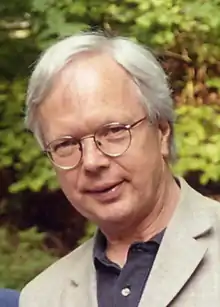Nicolaas Adrianus Rupke
Nicolaas Adrianus Rupke (born 22 January 1944 in Rotterdam) is a Dutch historian of science, who began his academic career as a marine geologist.[1]

He studied biology and geology at the university of Groningen and geology and the history of science at Princeton and Oxford. Early in his studies, Rupke was a Christian and proponent of Flood geology,[2] but later came to reject this position. When in 1977 he was elected to a Wolfson College, Oxford research position in the history of science, Rupke made this subject his full-time occupation. A series of similar international research posts followed, until in 1993 he took up a professorship at Göttingen University to teach the history of science and medicine.[3] In 2009, Rupke was awarded a Lower Saxony research chair.[4] In 2012, he took up an endowed professorship at Washington and Lee University in Lexington, Virginia, USA.
Rupke is known for his studies of late-modern biology, geology and science & religion. With an interest in the biographical approach, he restored to their contemporary prominence several nineteenth-century scientists, most important among them Richard Owen who well before the appearance of The Origin of Species developed a naturalistic theory of evolution, albeit a non-Darwinian one.[5]
Studies of Alexander von Humboldt came next,[6] in which Rupke developed what he terms the metabiographical approach by exploring how a famous life – in this case Humboldt's – may be multiply retold and reconstructed as part of different belief systems and memory cultures.[7]
Rupke is a fellow of Germany's National Academy of Sciences Leopoldina[8] and of the Göttingen Academy of Sciences.
Selected books
- Distinctive Properties of Turbiditic and Hemipelagic Mud Layers (with Daniel J. Stanley). Washington, DC: Smithsonian Institution Press, 1974.
- The Great Chain of History: William Buckland and the English School of Geology. Oxford: Clarendon Press, 1983.
- Vivisection in Historical Perspective (ed.). London, Croom Helm, 1987; Routledge, 1988.
- Science, Politics and the Public Good (ed.). London: Macmillan, 1988.
- Medical Geography in Historical Perspective (ed.). London: Wellcome Trust Centre for the History of Medicine, 2000.
- Richard Owen: Biology without Darwin (revised ed. of Richard Owen: Victorian Naturalist, New Haven and London: Yale, 1994, ISBN 978-0300058208) Chicago and London: University of Chicago Press, 2009.
- Alexander von Humboldt: A Metabiography (corrected edition). Chicago and London: University of Chicago Press, 2008.
- Eminent Lives in Twentieth-Century Science and Religion (ed.) (revised and much expanded edition). Frankurt a.M.: Lang, 2009.
- Albrecht von Haller im Göttingen der Aufklärung (ed. with Norbert Elsner). Göttingen: Wallstein, 2009.
References
- Who is Who in the World 2011 - 28th edition.
- Rupke, N.A. 1970. Prolegomena to a study of cataclysmal sedimentation. In Lammerts, W.E. (editor), Why Not Creation? pp. 141–179. Baker Book House, Grand Rapids, MI.
- "Die Geschichte der Naturwissenschaften als Lebensgeschichten", Jahrbuch der Akademie der Wissenschaften zu Göttingen, 2005, pp. 313-322. Autobiographical sketch in the Yearbook of Göttingen Academy on the occasion of Rupke's election as a member of the academy.
- http://www.uni-goettingen.de/de/108191.html. Press-release of the Lower Saxony Ministry of education about the "Niedersachsenprofessur 65+" (Lower Saxony research chair) 2009; Interview with Die Zeit
- Richard Owen: Biology without Darwin (revised ed. of Richard Owen: Victorian Naturalist, New Haven and London: Yale, 1994) Chicago and London: University of Chicago Press, 2009.
- Alexander von Humboldt: A Metabiography (corrected edition). Chicago and London: University of Chicago Press, 2008.
- "Lives after death". Steven Shapin's review in Nature, May 18, 2006, of Alexander von Humboldt: A Metabiography, discussing Rupke's metabiographical approach.
- Membership listing of the Deutsche Akademie der Naturforscher Leopoldina - Nationale Akademie der Wissenschaften.